Related Research Articles

Bangladesh, officially the People's Republic of Bangladesh, is a country in South Asia. It is the eighth-most populous country in the world, with a population exceeding 165 million people in an area of 148,460 square kilometres (57,320 sq mi). Bangladesh is among the most densely populated countries in the world, and shares land borders with India to the west, north, and east, and Myanmar to the southeast; to the south it has a coastline along the Bay of Bengal. It is narrowly separated from Bhutan and Nepal by the Siliguri Corridor; and from China by the Indian state of Sikkim in the north. Dhaka, the capital and largest city, is the nation's political, financial and cultural centre. Chittagong, the second-largest city, is the busiest port on the Bay of Bengal. The official language is Bengali, one of the easternmost branches of the Indo-European language family.

Coca-Cola, or Coke, is a carbonated soft drink manufactured by the Coca-Cola Company. In 2013, Coke products were sold in over 200 countries worldwide, with consumers drinking more than 1.8 billion company beverage servings each day. Coca-Cola ranked No. 87 in the 2018 Fortune 500 list of the largest United States corporations by total revenue. Based on Interbrand's "best global brand" study of 2020, Coca-Cola was the world's sixth most valuable brand.

Dhaka, formerly known as Dacca, is the capital and largest city of Bangladesh. It was established by the Mughal Empire as Jahangirnagar in 1610 as well as capital of Bengal Subah. It is the sixth largest and seventh most densely populated city in the world with a population of 10.2 million residents as of 2022, and a population of over 22.4 million residents in the Greater Dhaka Area. According to a Demographia survey, Dhaka has the most densely populated built-up urban area in the world, and is popularly described as such in the news media. Dhaka is one of the major cities of South Asia and a major global Muslim-majority city. Dhaka ranks 39th in the world and 3rd in South Asia in terms of urban GDP. As part of the Bengal delta, the city is bounded by the Buriganga River, Turag River, Dhaleshwari River and Shitalakshya River. The city holds the distinction as the world's largest Bengali-speaking city.

Mahbubul Haque Khan, best known as Azam Khan, was a Bangladeshi singer-songwriter, record producer, and lead singer for the pop-rock band "Uccharon". He was also a freedom fighter. He took part in the Liberation War of Bangladesh in 1971. He is considered to be one of the greatest artists in the history of Bangladeshi popular music.

The Coca-Cola Company is an American multinational beverage corporation founded in 1892, best known as the producer of Coca-Cola. The Coca-Cola Company also manufactures, sells, and markets other non-alcoholic beverage concentrates and syrups, and alcoholic beverages. The company's stock is listed on the NYSE and is part of the DJIA and the S&P 500 and S&P 100 indexes.
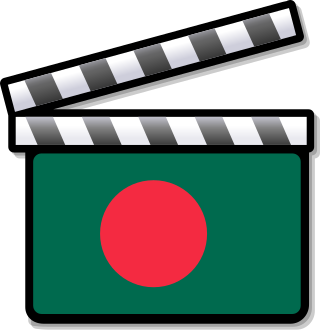
The Bangladeshi Cinema, better known as Dhallywood, is the Bengali-language film industry based in Dhaka, Bangladesh. It has often been a significant film industry since the early 1970s. The dominant style of Bangladeshi cinema is melodramatic cinema, which developed from 1947 to 1990 and characterizes most films to this day. Cinema was introduced in Bangladesh in 1898 by the Bradford Bioscope Company, credited to have arranged the first film release in Bangladesh. Between 1913 and 1914, the first production company, Picture House, was opened. A 1928 short silent film titled Sukumari was the first Bengali-produced film in the region. The first full-length film, The Last Kiss, was released in 1931.
Syed Manzur Elahi is a Bangladeshi businessperson and chairman of Apex group.
Kapasia is an upazila (sub-district) of Gazipur District in central Bangladesh, part of the Dhaka Division. It is located at 24.1000°N 90.5708°E, and is best known as the home upazila of Tajuddin Ahmad, the first Prime Minister of Bangladesh. The modern-day upazila was a part of the historic Bhawal Estate and falls within its boundary.

Sheikh Jamal was the second son of Sheikh Fazilatunnesa Mujib and Sheikh Mujibur Rahman, the first president of Bangladesh.
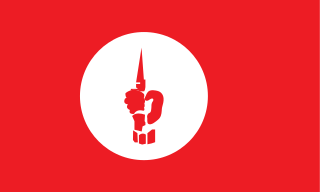
The Mukti Bahini, also known as the Bangladesh Forces, was the guerrilla resistance movement consisting of the Bangladeshi military, paramilitary and civilians during the War of Liberation that transformed East Pakistan into Bangladesh in 1971. They were initially called the Mukti Fauj.
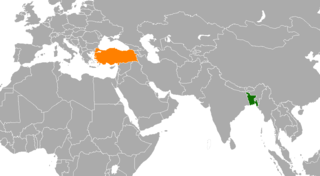
Bangladesh–Turkey relations are the bilateral relations between Bangladesh and Turkey. Both countries are members of the Organisation of Islamic Cooperation. Turkey has an embassy in Dhaka and Bangladesh has an embassy in Ankara and a consulate in Istanbul.
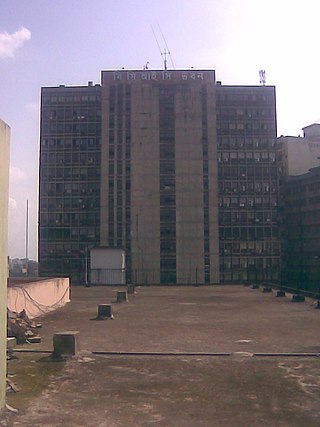
Bangladesh Chemical Industries Corporation (BCIC) is a government owned corporation in Bangladesh. Shah Md. Imdadul Haque is the chairman of Bangladesh Chemical Industries Corporation.
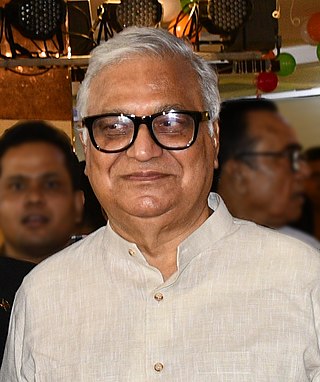
Mashiur Rahman is a Bangladesh Awami League politician and the Economic Affairs Adviser to the Prime Minister of Bangladesh Sheikh Hasina.
The Government agencies in Bangladesh are state controlled organizations that act independently to carry out the policies of the Government of Bangladesh. The Government Ministries are relatively small and merely policy-making organizations, allowed to control agencies by policy decisions. Some of the work of the government is carried out through state enterprises or limited companies.

Probal Chowdhury was a Bangladeshi freedom fighter, playback singer and composer. He rendered several songs from Swadhin Bangla Betar Kendra during the Bangladesh Liberation War. After the war, he pursued his solo career in playback.
2020 (MMXX) was a leap year starting on Wednesday of the Gregorian calendar, the 2020th year of the Common Era (CE) and Anno Domini (AD) designations, the 20th year of the 3rd millennium and the 21st century, and the 1st year of the 2020s decade.

The Old Dhakaites are an Indo-Aryan ethnocultural group viewed as the original inhabitants of Dhaka. They are sometimes referred to as simply Dhakaiya. Their history dates back to the Mughal period with the migration of Bengali cultivators and merchants to the city. The cultivators came to be known as Kutti and they speak Dhakaiya Kutti, a dialect of Bengali and the merchants came to be known as Khoshbas and speak Dhakaiya Urdu. There are sizeable populations in other parts of Bangladesh. The Dhakaiyas maintain a distinct identity in addition to their Bengali identity, due to cultural, linguistic, geographical and historical reasons. They have been described as a wealthy but very closed-off community; evidently being a minority in their own hometown. It is said that some people living in Greater Dhaka are even unaware of the existence of an Urdu-speaking non-Bihari minority community although their presence dates back centuries.

Abdul Monem Limited (AML) is one of the largest Bangladeshi industrial conglomerates. The industries under this conglomerate include beverages, sugar refinery, consumer products, real estate, construction materials etc.
Abdul Monem was a Bangladeshi industrialist and entrepreneur. He was given the title of Commercially Important Person by the Government of Bangladesh for his contribution to business. He was the founding chairperson and Managing Director of Abdul Monem Limited. The group owns Igloo ice cream and is the official bottler of Coca-Cola in Bangladesh.
Bengal Group is a Bangladeshi conglomerate. It was established in 1969. It includes Bengal Plastic the largest plastic manufacturer in Bangladesh. Morshed Alam, a member of parliament from Awami League, is the chairman of the Bengal Group of Industries. The Vice chairman of the group is Md Jashim Uddin, younger brother of Morshed Alam.
References
- ↑ "[WATCH] Gobinda Haldar: 1971 war lyricist". The Daily Star. 11 December 2015. Retrieved 8 October 2016.
- ↑ UNB, Dhaka (15 February 2021). "Freedom fighters' allowance to be raised to Tk 20,000: PM". The Daily Star. Retrieved 13 October 2022.
- ↑ "Bangladesh Freedom Fighters Welfare Trust". Banglapedia. Retrieved 8 October 2016.
- ↑ "Around 70,000 under scrutiny". The Daily Star. 18 August 2014. Retrieved 8 October 2016.
- ↑ Basher, Abul (13 October 2013). "Building the future of the leather sector". The Financial Express (Opinion). Dhaka. Retrieved 8 October 2016.
- ↑ "Hazardous Hazaribagh". Dhaka Tribune. Archived from the original on 29 December 2017. Retrieved 8 October 2016.
- 1 2 3 4 5 6 7 8 9 10 11 12 13 14 15 16 17 18 19 20 21 22 "All industries closed for corruption". New Age. Retrieved 3 August 2019.
- ↑ "Govt pays Moon Cinema Hall owner Tk 1 billion in cheque". bdnews24.com. Retrieved 13 October 2022.
- ↑ "Sector commanders for list of collaborators". The Daily Star. 16 December 2007. Retrieved 8 October 2016.
- ↑ Hossain, Kazi Mobarak. "Wait lingers for final freedom fighter list after 'work is done'". bdnews24.com. Retrieved 13 October 2022.
- ↑ "Cabinet lets major foreign investment deal slip". Dhaka Tribune. Archived from the original on 9 October 2016. Retrieved 8 October 2016.
- ↑ Byron, Rejaul Karim; Parvez, Sohel (3 December 2013). "Coca-Cola offers Tabani $16m to end bottling deal". The Daily Star. Retrieved 13 October 2022.
- ↑ "Proof that govt can't run real business". The Business Standard. 27 August 2022. Retrieved 13 October 2022.